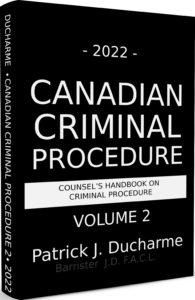 |
| Patrick Ducharme |
The topics upon which expert opinion evidence may be given are plentiful and diverse. Not surprisingly, it is often difficult for the court to keep abreast of new scientific theories and advancements. New scientific theories or techniques generally attract much closer scrutiny by the court before permitting the trier of fact to hear an opinion that may not be legitimate.
As a result, relatively new scientific theories or opinions must be viewed as reaching a threshold of reliability. There must be consensus in the field of expertise that a new scientific theory or opinion is shared by other experts knowledgeable and respected in the field. The court will be concerned that novel opinion evidence that is not scientifically acknowledged or respected may be misused by the trier of fact or may distract the trier of fact from a proper fact-finding process. It may also serve to confuse the trier of fact in such a way that it is counterproductive to the fact-finding process. It may be excluded also on the basis that it has the potential to distort the fact-finding process, or, to overwhelm the trier of fact.
The following factors will be considered in determining whether novel scientific evidence will be considered by the court:
a. Is the theory or technique capable of being tested?
b. Has the theory or technique been subjected to peer review?
c. Is the rate of error known?
d. Is the theory or technique generally accepted by other experts?1

The above is the an excerpt of Patrick J Ducharme's book, Canadian Criminal Procedure Volume 2, available at Amazon or in bulk through MedicaLegal Publishing along with Criminal Trial Strategies.
Subscribe to Patrick Ducharme's Youtube Channel
